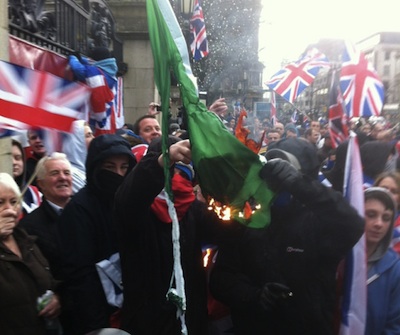
Trouble has broken out again in Belfast this afternoon after more than a thousand loyalists, including a number of masked paramilitaries, marched to the city centre to demand the Union Jack flag be reinstated year-round atop Belfast City Hall.
The march followed days of violence directed against the offices and homes of the Alliance Party and its councillors. The party’s votes on Belfast city council were crucial in reducing the flying of the British Union flag at City Hall from 365 days a year to 15 royal events and other designated days.
The change of policy has inflamed the larger unionist parties and right-wing elements in Britain. Today’s march had clear fascist overtones, and culminated with crowds cheering the burning of Irish tricolour flags by masked individuals.

It was supported by the unionist parties, the right-wing UKIP and the extreme-right BNP parties, and forced shops and the city’s Christmas market to close.
Rioting broke out later as marchers returning to east Belfast burned out a car on the Newtownards Road and threw stones at the PSNI police near the nationalist Short Strand.
Last night, there were also serious clashes in the Shaftesbury Square, Crumlin Road and Ligoniel Road areas of Belfast, as well as disturbances in Newtownabbey, Bangor, and Lisburn. Water cannon were deployed to douse burning cars.
Also last night, the loyalist paramilitary UVF were widely blamed for disrupting a large Christmas event in Newtownabbey, north of Belfast, after a number of vehicles were set on fire close to Mossley Mill.
Six hundred people, including many children, were trapped inside Newtonabbey council buildings as loyalists burnt cars and rioted.
The DUP has been widely blamed for motivating the violent protests. Today, the party refused to condemn the burning of the Irish flag at the protest in Belfast city centre.
The PSNI has said it accepts that loyalist paramilitary groups have been involed in orchestrating the disorder in Belfast and in the nearby towns.
Sinn Fein Assembly member Gerry Kelly has stated that “political unionism”, meaning the DUP and the Ulster Unionist Party, “must exert itself, show leadership and work to end this situation”.
“Political unionism has failed,” he said. “It has sent muted words and mixed messages which has seen loyalism come on to the streets and a continuation of road blocks, riots and intimidation for nearly a week now.
“Within the space of this week we have seen attacks on Belfast City Hall and Alliance party members homes and offices, death threats against elected representatives and many protests turning violent.”
The north Belfast representative said there was “nothing new” in the current scenario.
“We have seen the orchestration between political unionism and violent loyalism many times before when they did not get their way,” he said.
“We saw it in 1969, The Ulster Workers Council strike, the Anglo Irish Agreement and Drumcree to name a few occasions.
“But times have changed. Belfast is a shared city. It needs to represent all sections of the community that live in it and not have one identity stamped over all others. Unionism needs to accept the need for, and the reality of, equality.”
He said that mixed messages from unionists, such as demands for increased British flag flying at Stormont, was not showing leadership and would not de-escalate the situation.
“We need to see much more from unionist political leaders at all levels of representation across the north.
“They must exert themselves by standing firmly against the ongoing situation and taking real and meaningful steps to end the violence and intimidation on our streets.”
![[Irish Republican News]](https://republican-news.org/graphics/title_gifs/rn.gif)
![[Irish Republican News]](https://republican-news.org/graphics/title_gifs/harp.gif)

